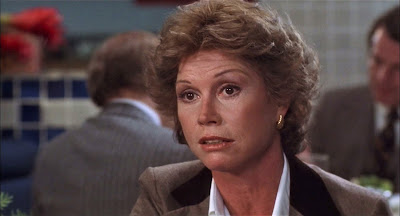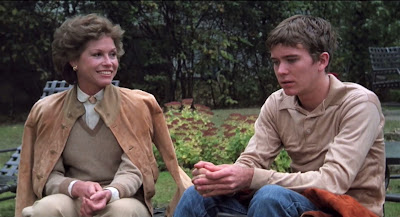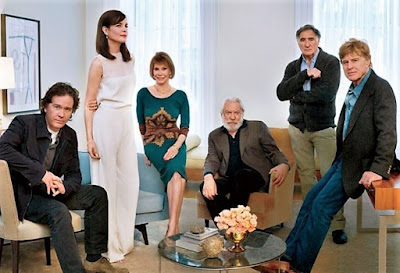"Every unhappy family is unhappy in its own way." - Tolstoy
Ordinary
People won the 1981 Best Picture
Oscar against Raging Bull, The Elephant Man, Tess,
and Coal Miner's Daughter. While hindsight and time have confirmed my personal opinion that Martin Scorsese’s
searing and ambitious Raging Bull was the more deserving prize
recipient that year, I must assert that in saying this, I am in no way
diminishing or discounting the brilliance that is Ordinary People. It's an easy film to dramatically discredit due to its essentially conventional structure and familiar domestic themes. And it's an easy film to creatively overlook because it lacks both the cinematic bravura and operatic scope of
Scorsese’s masterpiece. But, when leaving these comparisons aside, director Robert Redford's Ordinary People has always struck me as one of the most emotionally eloquent and evocative domestic dramas I've ever seen.
The passion of Scorsese's beautifully rendered biographical character study may move me aesthetically, and I'm aware that part of me responds most strongly to it (as I do with Stanley Kubrick's films) on a largely cerebral level--I'm just so impressed with its filmmaking craft. But to this day, of all the movies nominated that year, I still find Ordinary People to be the most deeply affecting of the lot. Its poignance speaks to me in ways that perhaps have little to do with art, but everything to do with its compassionate point of view and my enduring fondness for motion pictures that explore the human condition.
The passion of Scorsese's beautifully rendered biographical character study may move me aesthetically, and I'm aware that part of me responds most strongly to it (as I do with Stanley Kubrick's films) on a largely cerebral level--I'm just so impressed with its filmmaking craft. But to this day, of all the movies nominated that year, I still find Ordinary People to be the most deeply affecting of the lot. Its poignance speaks to me in ways that perhaps have little to do with art, but everything to do with its compassionate point of view and my enduring fondness for motion pictures that explore the human condition.
As the years go by, I come to appreciate Ordinary People’s simple, straightforward approach more and more, for its look feels less like the absence of style in a first-time director than a deliberate attempt on Redford’s part to use the film's crisp, conventional look as a commentary on the role conformity and the illusion of appearances play in the world these people inhabit. A
means of training the focus on what’s most important to the story: repression and the inability of its characters to understand and express feelings that fall beyond the scope of coping mechanisms of structure, order, and self-control.
 |
| Mary Tyler Moore as Beth Jarrett |
 |
| Donald Sutherland as Calvin Jarrett |
 |
| Timothy Hutton as Conrad Jarrett |
 |
| Judd Hirsch as Dr. Tyrone C. Berger |
 |
| Elizabeth McGovern as Jeannine Pratt |
 |
| Dinah Manoff as Karen Alrich |
Ordinary People tells the story of the Jarretts, an upper-middle-class family living in the Chicago suburb of Lake Forest, an affluent neighborhood of spacious homes, manicured lawns, and people skilled in the art of emotional repression. Fittingly, the film opens with a montage of tranquil, postcard-perfect images of this tony residential community, for in this beige-colored, WASP enclave, appearances seem to do all the talking. Most vociferously, these meticulously kept-up appearances speak of status and wealth, but they're also an avowal of the belief that if everything looks right, it must then certainly be right.
From order comes security, and security must, therefore, bring happiness. The unexpected is kept at bay. Everyone is safe. Lives are happy. All is as it should be, and there is no mess—except for in the Jarrett household, where, bit by bit, their lives are slowly coming apart.
 |
| Keeping Up Appearances |
The loss of the older brother he looked up to causes Conrad to suffer a nervous breakdown born of survivor's guilt and from the feeling that, in the eyes of his parents, he'll never measure up enough to compensate for the void. Beth, who one senses blames Conrad for his brother’s death, has virtually shut him out of her life. Unable to display affection and withholding approval, she thinks that Conrad’s suicide attempt was a deliberate act of revenge directed at her (the deed left the image-conscious Beth having to weather both the stigma of having an institutionalized son and the humiliation of others knowing that all is far from orderly in the Jarrett household).
Calvin, stuck in the role of conciliator, drinks a bit too much and tends to turn a blind eye to what he perhaps knows/fears to be true between
Beth and Conrad. In his earnest efforts to make everything nice, he too, lives in a state of denial about his feelings.
 |
| Recovering from shock therapy, left behind a grade for his months-long stay at a mental hospital, Conrad feels the pressure of others wanting things to return to "normal" as quickly as possible |
In chronicling Conrad’s journey toward forgiveness (himself and his mother) Ordinary People’s look at the dysfunction within a by-all-appearances functional family covers little of what I’d call new ground. Certainly not after all those ’60 post-Graduate films eviscerating the middle class for their false values, the wave of Vietnam-era ‘70s films and TV movies devoted to cultural soul-searching, or the 1973 PBS documentary An American Family (television's first reality show), which regaled us with the spectacle of the disintegration of a quintessential WASP family from the comfort of our living rooms.
But where Robert Redford succeeds in making Ordinary People an uncommonly perceptive look at a familiar topic is how his direction displays an insider's insight into this world and the people who inhabit it. There are none of the cliché, easy-target jibes at the upper-middle-class typical of the "domestic disintegration" genre. In its place is an intimate familiarity with the WASP rituals of suppression (few interactions occur outside of the formalized: meals, cocktail parties, golf games, and "keeping busy" are the cure-all panacea), empathy for the adult characters, and compassion for the adolescents.
WHAT I LOVE ABOUT THIS FILM
Ordinary
People was a critical and commercial success upon release, its few
detractors mostly citing it as perhaps a little too ordinary in its
approach for its own good. A solemn, pedigreed, adult drama about important issues, Ordinary People is the kind of film
studios once touted as a “prestige picture,” and critics would label “Oscar
bait” (Indeed, it was nominated for six Oscars, winning four: Picture, Director, Supporting Actor, and Adapted Screenplay.)
Almost too refined and tasteful for the messiness of its subject matter, Ordinary People’s family-in-crisis themes, relaxed, naturalistic performances, and distinct lack of showy, cinematic
tricks (a welcome rarity from a first-time director) still have many feeling that Redford’s
film is little more than a superior movie-of-the-week.
But to me, what Ordinary
People lacks in visual distinction (not entirely fair, John Bailey’s
cinematography, evoking the chill and melancholy beauty of autumn in the
Midwest, is remarkably expressive), it makes up for in keeping the viewer emotionally rapt in the Jarretts' domestic free-fall. Ordinary People’s greatest strength has
always been its characters, the tenuous structure of their relationships, and the depth of emotional authenticity the film’s
remarkable cast brings to Alvin Sargent’s splendid screenplay (from
Judith Guest’s 1976 novel).
The entire cast of Ordinary People is extraordinary, but Mary Tyler Moore wasn't fucking around. She brings it like gangbusters in her portrayal of Beth, inhabiting the character in a way that leaves you feeling her role in the film is larger than it actually is. Every one of her scenes is virtuoso, but here are my favorites:
The entire cast of Ordinary People is extraordinary, but Mary Tyler Moore wasn't fucking around. She brings it like gangbusters in her portrayal of Beth, inhabiting the character in a way that leaves you feeling her role in the film is larger than it actually is. Every one of her scenes is virtuoso, but here are my favorites:
 |
| "Give her the goddamn camera!" Never has Mary Tyler Moore's ready smile been used to better knots-in-the-stomach effect |
 |
| "Mothers don't hate their sons!" After so much politeness, Moore & Sutherland finally squaring off is electrifying |
 |
| The Hug On a scale of emotional power, this reverberated through the theater like the chest-busting scene in Alien. I swear, the entire theater seemed to gasp and break into LOUD sobs all at once |
PERFORMANCES
Dating back to the first time I ever saw Rebel Without a Cause on TV, I've seldom liked how teenagers have been written or portrayed on screen (except in low-budget '50s and '60s rock & roll musicals). They always seem to have a little too much autonomy, and the graceful, perfect actors playing them too often look like they're play-acting at youthful gawkiness and insecurity. Timothy Hutton turns in an exceptional performance simply by giving the impression he's not "playing" at anything...he's being. He comes across as genuine and age-appropriately hamstrung by his emotional confusion, his character's anguish made all the more heartbreaking because he also comes across as such a sweet, sensitive kid.
Hutton works a kind of miracle with Conrad, granting us a portrait of a tortured youth that manages to sidestep the usual problematic “troubled teen” clichés that so often come across as self-pitying and self-indulgent. Hutton was just 19 at the time, yet there’s nothing callow in how perceptively he conveys the feelings of a young man grappling with grief and self-recrimination. Given that this is the young actor's first major film role (for which he won an Oscar in the bargain), the intensity of feeling Hutton brings to his character is perhaps too-easily attributed to his having lost his real-life father just four months prior to filming (actor Jim Hutton succumbed to liver cancer at age 45); but I think it's just a case of a very talented actor meeting with the perfect role.
 |
| Adam Baldwin, Hutton, Carl DiTomasso, Fredric Lehne |
As the
'80s ushered in the era of the insufferable teenager—interchangeable slasher
victims or indistinguishable coming-of-age
horndogs—Ordinary People's
realistic adolescents gently broke from tradition. Frederic Lehne plays a
high school jock actually capable of showing compassion; Dinah Manoff, as Conrad's
friend from the mental hospital, struggles to keep depression at bay through
strained positivity; and most appealingly of all,
Elizabeth McGovern (also making her film debut) as a classmate with
whom Conrad shares a mutual crush. McGovern, who has the quirky,
natural charm of a young Paula Prentiss (a frequent Jim Hutton co-star), manages to rescue her character, through
sheer force of originality, from being a plot-functional "dream girl" who exists solely to guide Conrad back
into the world of feelings.
Much in the manner that The Graduate's Mrs. Robinson is set up to be that story's villain, yet emerges its most sympathetic character; Beth, in the hands of Mary Tyler Moore, while never quite sympathetic, is so powerless, yet so resolute and repressed, she becomes a tragic figure.
THE STUFF OF DREAMS
BONUS MATERIAL
Copyright © Ken Anderson 2009 - 2018
 |
| The charming naturalness of Hutton and McGovern adds poignance to their scenes |
Both Redford and
Moore have stated that the character of Beth and her inability to display
affection reminded them of the non-relationship each had with their respective emotionally-remote, perfectionist fathers. I grew up at a time when, via TV shows
like Father Knows Best and Leave It to Beaver, the patriarchal
ideal defined the perfect family. That’s why Ordinary People’s fence-straddling,
somewhat ineffectual, but well-intentioned Calvin Jarrett came as such a welcome surprise to me;
at last: a divergence from the all-knowing authoritarian father figure of
pop-culture propaganda.
Taking on the kind of peace-keeping, empathetic role typically afforded the long-suffering wife in these sorts of domestic dramas, Donald
Sutherland—a personal favorite and the only major cast member to fail to
receive an Oscar nod—gives an understated performance (Redford initially
wanted him for the psychiatrist) whose nuances are all too easy to overlook. An
actor most eloquent in his silences (Sutherland’s eyes tend to be more
expressive than his face) is at a distinct disadvantage in a film full of so
many showier performances; but Calvin’s restrained
gentleness has the much-needed effect of humanizing Beth (some part of her must
have appreciated his vulnerability) and of making Conrad’s estrangement less torturous, for it's clear he has at least one person in the household in his corner.
 |
“Beth was the
character he [Redford] most cared about, and he wanted her to be portrayed with
sensitivity. It was she who drew him to the project” - Mary Tyler Moore
What drew me to Ordinary
People was Mary Tyler Moore. I was sitting in a movie theater sometime
during the summer of 1980 when I saw the trailer for Ordinary People for
the first time. If you’ve never seen it, it’s one of those artfully modulated 2½
minute gems that builds in intensity until the fade-out has everyone in the
theater murmuring in excitement. Like most everybody else in America at the
time, I was still in the throes of Mary Richards withdrawal. The Mary Tyler
Moore Show had ended in 1977, but Moore had been a consistent, cheery staple of
television since The Dick Van Dyke Show premiered in 1961, so, even with reruns
to salve the pain, by 1980 it still wasn’t easy living in a world without Mary.
I had no advance awareness of Ordinary People, so when Mary Tyler Moore appeared in the trailer behaving in a very un-Mary-like manner, I (and many others in the theater) let out an audible gasp. By the time the trailer was over I was aware of having been gripped by the same excitement I felt when back in 1974 I first read Ann-Margret was to appear in a Ken Russell film (Tommy); or in 1979, when the news came out about Olivia Newton-John, the squeaky-clean queen of soft rock, collaborating with British rockers Electric Light Orchestra on a little ditty called Xanadu. The potential for something unpredictably brilliant is always linked to a star going counter to their image and being cast against-type; so, when Ordinary People opened on Friday, September 19th, I happily stood in line to see it. I wasn’t disappointed.
I had no advance awareness of Ordinary People, so when Mary Tyler Moore appeared in the trailer behaving in a very un-Mary-like manner, I (and many others in the theater) let out an audible gasp. By the time the trailer was over I was aware of having been gripped by the same excitement I felt when back in 1974 I first read Ann-Margret was to appear in a Ken Russell film (Tommy); or in 1979, when the news came out about Olivia Newton-John, the squeaky-clean queen of soft rock, collaborating with British rockers Electric Light Orchestra on a little ditty called Xanadu. The potential for something unpredictably brilliant is always linked to a star going counter to their image and being cast against-type; so, when Ordinary People opened on Friday, September 19th, I happily stood in line to see it. I wasn’t disappointed.
Giving everyone involved
in this film their due and not taking a single thing away from a single
performance, it nevertheless remains my emphatic assertion that whatever heights
Ordinary People soars to—as either motion picture or human drama—are
reached on the wings of Mary Tyler Moore’s performance. She’s better than good
here. Her performance emanates from a place of truth that serves as a tether
wrenching Ordinary People back to reality every time it appears to veer
into soap opera or Lifetime movie territory. I find her to be absolutely
astounding.
And not for one
moment do I pretend to dissociate my reaction to the character of Beth from my personal
response to Moore in the role. It’s precisely my inability to fully wrest my awareness
of Moore’s endurably likable TV persona from Beth’s rigidity that gives the
performance its power. The incongruity of Moore’s quick-to-smile façade
masking such groundswells of anger and stony reserve produces in me the exact
reaction I imagine Beth’s country club friends would have were they ever catch
a glimpse of what lies behind her perfect life of order.
 |
| Everyone from Ann-Margret to Lee Remick was considered for the role Moore called "The Holy Grail of my career." |
Although it’s heartbreaking
to see the degree to which Beth’s steely reserve and need to keep up
appearances hurts her family, Moore makes Beth’s defiant defense of her own
fiercely guarded vulnerability a thing of icy beauty. You can see the pain, you
can see the inner struggle, you can even see what she is most fearful of having
to confront by letting down her guard (her sense of being a failure at something that seems very, very important to her--achieving perfection); but just
as clearly you can see that she can’t help herself. Like everyone else, she too,
is a victim of grief, her coping mechanisms as imprinted on her character as her name
on a Marshall Field’s credit card.
Much in the manner that The Graduate's Mrs. Robinson is set up to be that story's villain, yet emerges its most sympathetic character; Beth, in the hands of Mary Tyler Moore, while never quite sympathetic, is so powerless, yet so resolute and repressed, she becomes a tragic figure.
THE STUFF OF DREAMS
In these days of manufactured social media self-presentation, Photoshop perfectionism,
and smartphone photo filters that turn their subjects into pore-free mannequins, a movie
about the folly of keeping up appearances and the impossible pursuit of flawless “perfection”
could perhaps not be more relevant.
And although Ordinary
People is one of the whitest movies ever made, I’ve always been able to
identify with it because the image-conscious middle-class world it dramatizes is
not at all different from my own childhood growing up as one of the few Black families
in an all-white neighborhood.
 |
| Everything in its Place |
In the assimilationist household I grew up in, upward
mobility meant the strict adherence to respectability politics. Under scrutiny whether we were shopping, playing outside, or just emptying the garbage, our family had
to be a model of everything white America didn’t expect or want us to be. Black excellence (via perfectionism and achievement) was present in everything from how we kept up our house to how we dressed for school. Although we were a household of five (two older sisters had already married and moved out) and under a great deal of social pressure, we rarely spoke of these matters to one another because, by necessity, the needs and problems of the individual were sublimated to the goals of the family in particular, civil rights and the advancement of all of black America in general.
And let's not forget that during all this, I, as the only boy in the family and gay to boot, instinctively lapsed into "The Best Little Boy in the World" mode; neat, well-mannered, drug-free, straight-A student...all so that I'd never give my parents a moment's worry, ensuring that the pesky little topic of "gay" would never come up.
And let's not forget that during all this, I, as the only boy in the family and gay to boot, instinctively lapsed into "The Best Little Boy in the World" mode; neat, well-mannered, drug-free, straight-A student...all so that I'd never give my parents a moment's worry, ensuring that the pesky little topic of "gay" would never come up.
No wonder I so identified with all that guilt Conrad carried around!
Were it not for my mother going through
EST training in the early ‘70s (after which, talking about EVERYTHING became the household standard, resulting in even my conservative dad becoming alarmingly liberal), I think we could have wound up like the Jarretts.
One of the themes of Ordinary People is that not all breaks are clean, and not everything can be put back together again. But one of life's gifts granted to us as people is that we have this amazing capacity to endure and move on. Like the Edna St. Vincent Millay sonnet that opens Judith Guest's novel reminds us:
What a shining animal is man,
Who knows, when pain subsides, that is not that
For worse than that must follow yet can write
Music, can laugh, play tennis, even plan.
The cast of Ordinary People reunited for Vanity Fair in 2011. Photo by Mark Seliger
Ordinary People theatrical trailer
 |
| click to enlarge |
Ordinary People was released Friday, September 26, 1980 at the Bruin Theater in Westwood, CA
































